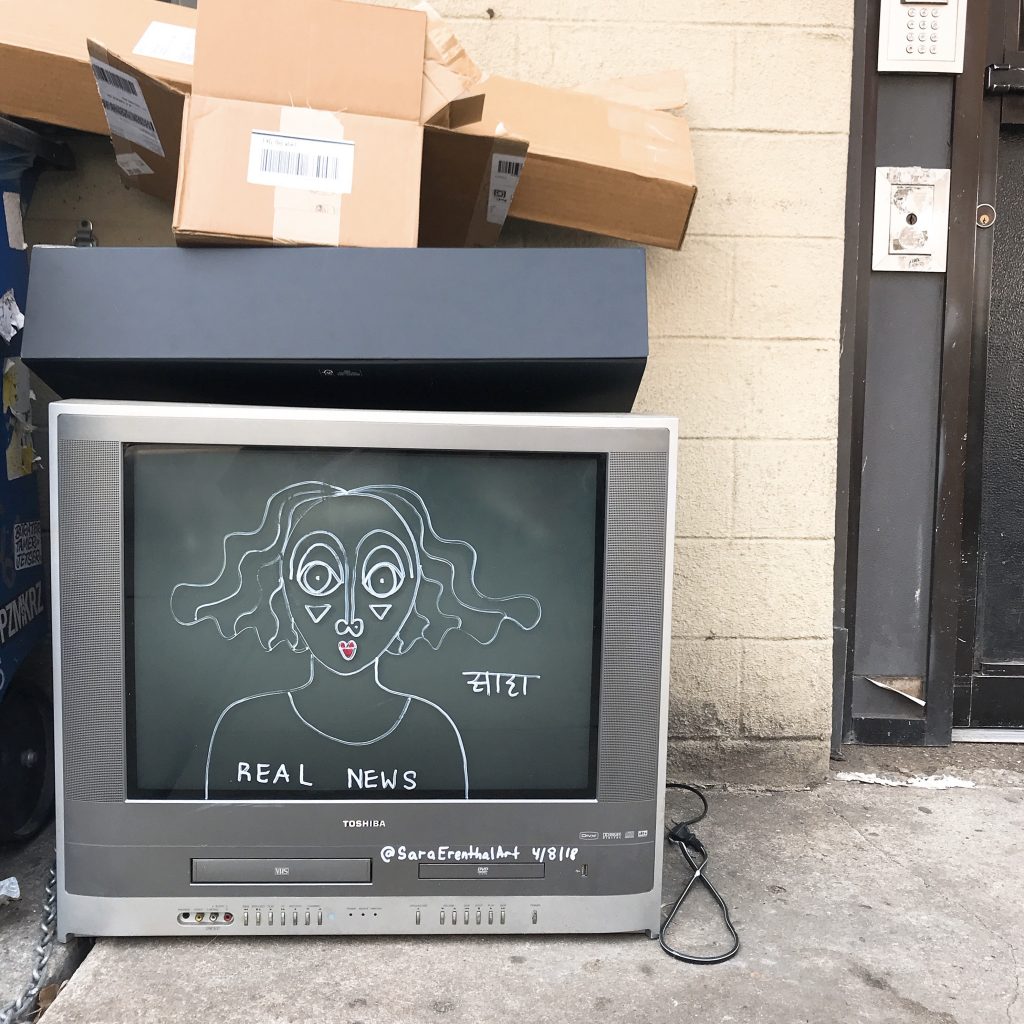
As I walked past my apartment’s trash bins on my way to a cafe to write this post, I came across Sara Erenthal’s street art that turned an abandoned television into an artwork. The word, “Real News,” framed in a television-trash (in a literal sense), immediately captured my attention. When did we start to put “real” in front of the word “news” or “fact” (with or without irony)? Do the words such as “real” or “news” (or fact, truth, etc.) still have as much credibility in the age of the Internet and social media as they used to have (mostly in the age of more traditional forms of journalism)? What constitutes real, fact, news and who approves the validity? Although the contents and the specific contexts of this week’s readings are in a wide-range, I think these are some of the basic and recurring questions. I spent more time than I expected to in doing both close and “lateral reading” (Sam Wineburg) of this week’s articles (i.e. following the hyperlinked texts, Googling some names or websites as suggested, skimming through the Wikipedia talk pages, etc.) and I needed to stop reading at a certain point, because otherwise I wouldn’t be able to write a post. I think this discursive journey reflects the process of reading and writing from/on the digital platforms, as the sources on the Internet are abundant (with or without multiple hyperlinks or further-related readings). Compared to my previous provocation for the ITP Core 1 class, which was a close reading of the chapters 3 and 4 of Paulo Freire’s Pedagogy of the Oppressed, the experience of reading and writing about “digital literacy” already embodies the different nature of knowledge/information production and circulation system. This is more personal remark based on my experience of writing, so if it doesn’t make any sense here I hope I can articulate it more in class. But the reason why I brought up the experiential layer is to emphasize the that digital literacy is a different mode of literacy, thus should be taught differently. The question is, HOW?
Sam Wineburg, Barbara Fister, Alex Juhasz all share similar anxieties over the culture built on the Internet–the circulation of misinformation/disinformation. I think all of them are good at identifying the problems and arguing for the changes, but I think the solutions they are providing should be more concrete and specific.
Sam Wineburg mentions four steps to “combat” fake news very briefly and generally. His article ends with saying “Schools must prepare kids for the real world instead of shielding them from it,” and I agree with his general idea, but I was not sure if he is proposing an individual teacher’s role and/or more organizational-educational reform. He emphasizes the teacher’s role and suggests, “Make sure teachers are trained on the matter.” However, I think the part of anxiety or struggle over this issue is that “adults” (as opposed to the digital natives) are not sure where we are heading towards, and there’s not always clear consensus on this issue. Barbara Fister’s article is also good at identifying the problems that Twitter, Facebook, Google produce, but again her article ends with “I don’t even know where to start”—which was a bit disappointing to read at this moment.
How can we move one step further to think about what we can teach more concretely–starting from where the authors left off? In the context of Facebook data breach and Mark Zuckerberg’s Facebook hearing, how can the educators take advantage of it as a teaching moment? How can we concretize individual educator’s role but not lose sight of the institutional and societal aspects?
One of the hyperlinked articles from one of the readings this week—“Media literacy in 2016: Strategies to decipher what is real and what is fake news on your newsfeed”— includes some key questions we should be asking about our media consumption (not only limited to digital media):
Who is the sender of the message?
What is their motive or intent?
Who benefits from the message?
What tips and tricks do they use to get their message across?
Who is their intended audience?
What are they leaving out?
How could others interpret the message differently than you?
Do you think we need to add more questions specifically relating to digital media consumption? What are some questions that you can think about to add-on in general or more specifically relate to your field of study? How can we think about digital literacy and digital platforms beyond moralizing ground (meaning beyond just blaming the individuals or organizations spreading propaganda-fake-misleading information)? Do you think “reading laterally” is a good way of critically consuming information? I had an impression (and correct me if I am wrong) that much discussions around digital literacy are still focusing more on words and not much on the visual side of it. What was your impression?

